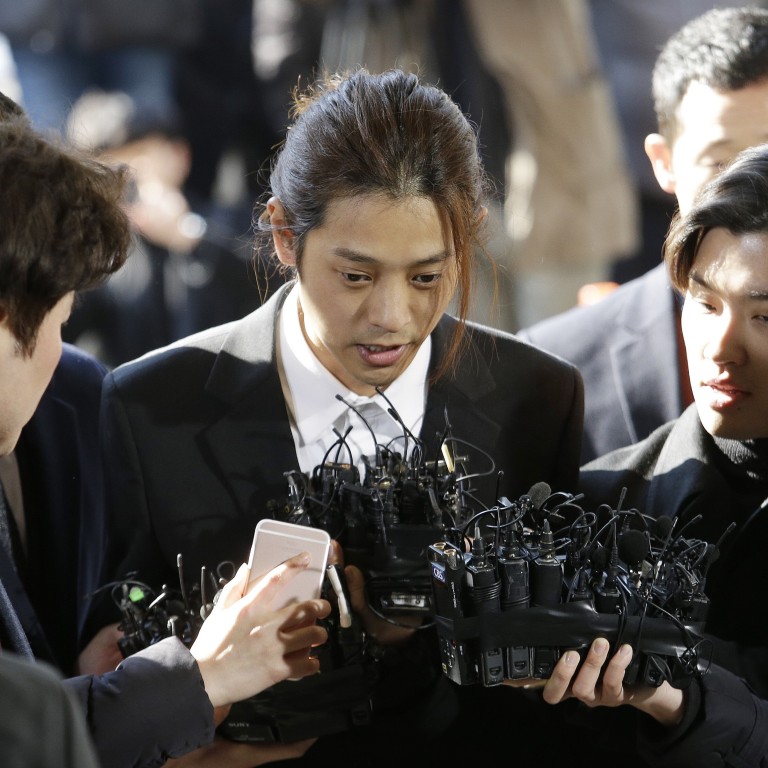
Jailing of K-pop stars Jung Joon-young and Choi Jong-hoon offers ray of hope in dark year for the industry
- The jailing on rape charges of the two South Korean stars is a welcome first step towards ending the misogyny and victim blaming rampant in K-pop
- The convictions should also offer hope to South Korean women who have been victims of secretly recorded sex videos, revenge porn and ‘molka’
The jailing of South Korean stars Jung Joon-young and Choi Jong-hoon on rape charges offers a ray of hope in what has been a dark year for K-pop.
While K-pop followers will look back on 2018 as a triumphant year for South Korea’s biggest cultural export, with many outfits achieving unprecedented international success and boy band BTS becoming the first K-pop act to top the US album charts, 2019 will mostly be remembered for a series of tragedies and scandals that shook the industry.
The apparent suicides of singers Sulli (October 14) and Goo Hara (November 24) came towards the end of a year that had already seen the downfall of BigBang member Seungri over prostitution allegations and a sex and drugs scandal at a nightclub he was a director of, and the exposure of a revolting chat room where stars including Jung and Choi shared videos of themselves raping women who were drunk or unconscious.
The actions of these men have shown that beneath the cheery facade of K-pop – with its plastered-on smiles, short skirts and feigned innocence – lurk some very dark forces.
K-pop giants BTS named best group at American Music Awards
Both men reportedly wept in the courtroom when their sentences were announced, but only they know whether their tears were shed over the deaths of their careers and reputations, or out of shame for their actions and remorse for their victims.

Despite the horrific crimes of which Jung and Choi were convicted, victim blaming was rampant and male privilege was on display even after the stars were sentenced to jail.
“This is rather too much for this type of crime,” one supporter posted online. “These women were not kidnapped on the street, but followed the handsome singers.”
Jung, Choi and Seungri are products of a misogynistic, sexist culture that dominates not only K-pop but South Korea as a whole. And this culture should share some of the blame for the deaths of Sulli and Goo.
Sulli had been hounded online by staunch defenders of South Korea’s moral code for perceived crimes such as occasionally not wearing a bra and speaking out on feminist issues, while Goo had been relentlessly slut shamed after a disgruntled ex-boyfriend threatened to release a video of them having sex.
After they split up last year, Goo’s former boyfriend threatened to “end her entertainment career” by leaking the footage and a clip later circulated of her kneeling before him apparently begging him not to. He was later convicted of blackmail and sentenced to 18 months in jail, suspended for three years, but acquitted of other charges including assault.

Even though she was dealing with a career-threatening scandal of her own, Goo even helped expose the sex video chat room case by working with reporter Kang Kyung-yoon, who released the initial reports on Jung Joon-young’s KakaoTalk chat rooms.
In handing down his sentences to Jung and Choi, judge Kang Seong-soo said the singers had “used their status as K-pop stars to lure the victims, who were young women hoping to later debut in the entertainment industry”.
The two singers had treated their victims as “sexual objects” to be exploited, the judge added. “They should assume social responsibility in proportion to their fame and wealth.”
They had raped women who were “drunk and unable to resist, filmed them nude and having sex, then spread it on a group chat … We can’t imagine the pain the victims might have felt who found out later.”

Previously, a sex video would only prove fatal to the career of a female K-pop star. But now, two male K-pop celebrities who filmed themselves gang raping women and joking about it will spend years behind bars. This is a welcome first step towards ending the misogyny and victim blaming that is rampant in the K-pop industry.
Adam Wright is the entertainment editor of the South China Morning Post.

